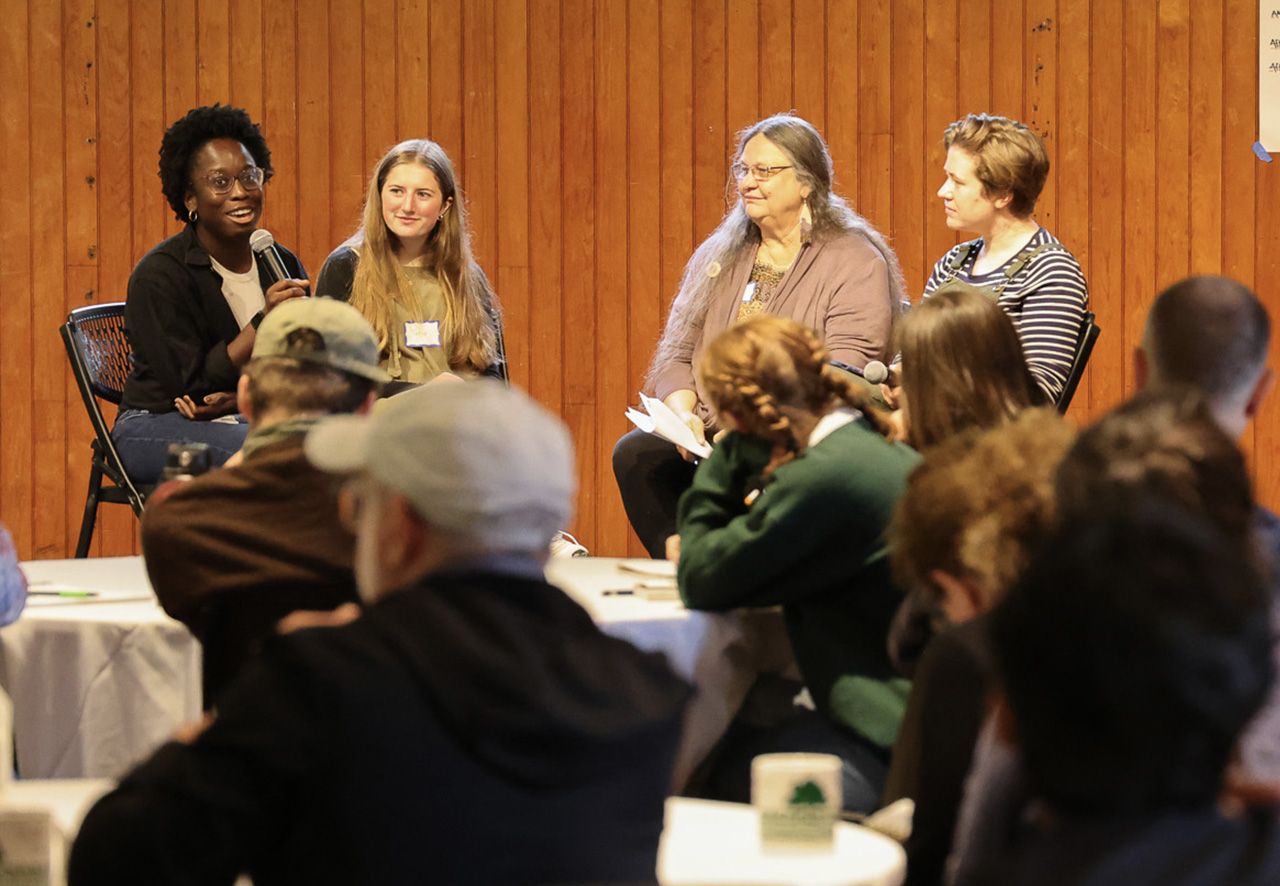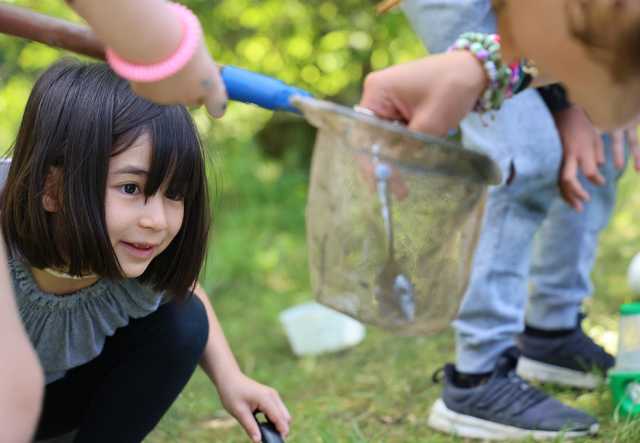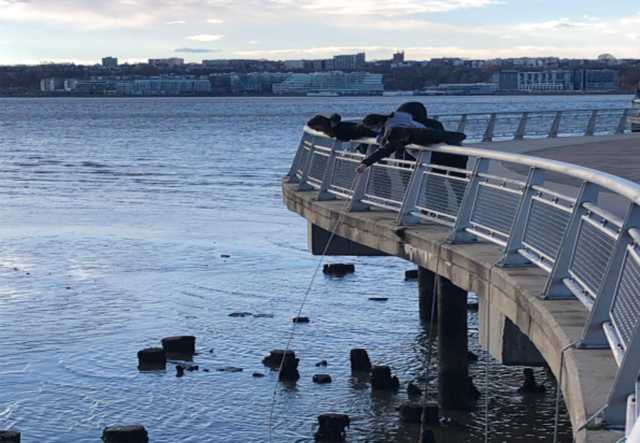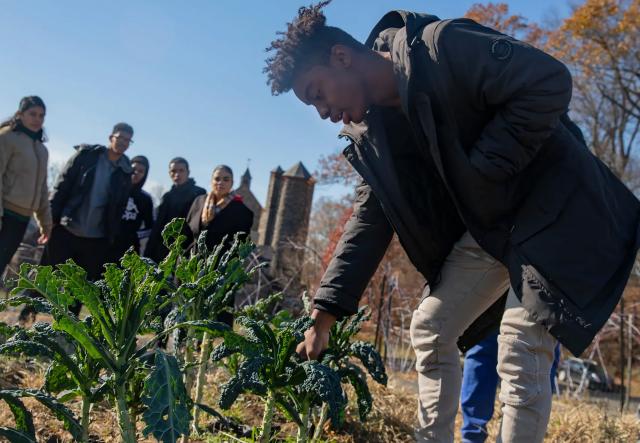Exploring Diverse Perspectives on Climate Change Education
Addressing a challenge as massive as climate change demands collaborative thinking and coordinated action. Earlier this month, more than 50 visionaries from across our region—educators, youth, and nonprofit leaders—gathered at Shelburne Farms for a day of collective learning and conversation to accelerate positive impact and chart a course for the future, together. Attendees are members of the Northeast Climate Change Education Collaborative, 80+ organizations in New England dedicated to educating for climate action organized by Shelburne Farms Institute for Sustainable Schools.

The morning featured a panel discussion exploring diverse perspectives on climate change featuring, left to right, Amara Ifeji (Director of Policy, Maine Environmental Education Association), Taylor Barry (350NH Youth Team Action Fellow), Judy Dow (Executive Director, Gedakina), and moderator Hannah Barg (Youth Climate Program Manager, The Wild Center).
Here are a few highlights from their conversation.
Hannah: Can you share a personal experience or success story in the work that you do?
Judy: I wrote a paper ten years ago, Going Through the Narrows, about the path we’re taking through climate change. We’re ‘going through the narrows:’ the water is rough, the currents are different, the air flows are different. It’s in the narrows where you have to decide, what direction are you going to take? Are you going to turn back to the calm harbor, or are you going to go into the broad waters? There are tools you have to use to get you through the narrows: respect, responsibility, relationships, reverence, and reciprocity. These tools will teach you how to pick up those that fall down and help them get through. They’ll help you give back to the land…Because you will never have a healthy economy if you do not have healthy land.
Hannah: Climate education is multifaceted and includes many different disciplines across topic areas. What area of climate education do you strive to enhance or advance, and why is it important that young people learn about it?
Taylor: In the past year, the 350NH team worked on a climate literacy campaign in New Hampshire, and the primary avenue through which we did that was a bill, called HR 30. HR 30 aimed to create a more robust climate literacy curriculum in New Hampshire. The reason why I’m saying climate literacy is that it’s not just about climate change, but the socioeconomic implications. That includes talking about jobs and clean energy, ways in which people can lower their ecological footprint, positive developments in the environmental movement, local impacts, and social impacts. We wanted to provide New Hampshire students with a more holistic overview of climate change and prepare them to become the next generation of leaders in climate activism, and to prepare them for a future in which climate change is going to affect us more and more. (Note: New Hampshire HR 30, the resolution urging robust climate education that Taylor mentions here, was voted “indefinitely postponed.” You can read more about 350 NH’s ongoing efforts on their blog.)
Amara: I’m thinking about the social sciences. It’s really important to frame the climate crisis as a cultural shift we’re going to need to make—and that’s literally what the social sciences are about. I’m really passionate about ensuring that social justice is part of climate literacy. On a personal note, I grew up in Maine, I moved there when I was nine. I had two things I was really passionate about: having a more equitable and inclusive community at my school in Bangor, and also the environment…but I actually never let those two things intersect. As a young person I was very scared of ‘racializing’ an issue like environmentalism. In hindsight, I know now that the communities that I’m a part of, and other people of color communities, are the most impacted by the climate crisis. So it only makes sense that a social justice lens is applied to teaching and speaking about climate. I’m really grateful that when I talk to youth who look like me, I’m able to make that intersection. They too can see themselves in the work.
Hannah: How do you envision climate education as a powerful catalyst for social transformation?
Amara: I truly think that having access to the outdoors changed my life. It changed the path that I’m on. It changed the way that I think about engaging with the world. I did environmental science research, first in my basement, and then started doing community science. I took that to grassroots advocacy, and now I work in policy and advocacy. My connection to the outdoors has changed how I see myself engaging in the world and the change that I want to see and be. For a lot of youth, if given the opportunity to explore and be outdoors, to learn about climate education, it might make an impact on their lives. They might do things differently. They might want a different job, they might try to lead that job in a more sustainable way or be more sustainable in their own lives. Social transformation is individual people continuing to make better choices for the planet and the world that we love, the only world that we have.
Hannah: Can you talk about the role that you see intergenerational climate action playing in the work that you do? And can you talk about climate anxiety, grief, anger, and other emotions that surface in this work?
Taylor: It’s important that youth get involved in climate action because it’s our future that we’re fighting for. We may have different perspectives on how we’d like to see [climate action] turn up in our current legislation, but it’s also important that we have those older than us working with us because they can provide us with the experience that we haven’t gained yet. HR 30 is a really good example of that. And speaking to the climate anxiety and fear question, a common misconception, especially among teenagers, is that there’s nothing you can do about climate change. But it’s important to know that’s not the case. In HR 30 we really tried to address that by providing students with hope by detailing the ways they can get involved, whether that’s becoming more sustainable or jobs in the field. We hope to empower students to take action, to prove there are a lot of people working on this, and it’s not hopeless.
Hannah: When you think about the future, what gives you hope?
Judy: My grandchildren. We were raised to believe in seven generations, where your actions, words, and deeds need to be reflective of the fact that people seven generations back and seven generations forward will see them and hear them. How long is seven generations? That’s 150 years. How many ancestors is that? About 128 per person. That’s a lot. Roughly 20,000 people make up the genes that are in your body. I wrote those numbers down thinking, my grandchildren, what’s going to happen to them? Everything I do, I think of what’s going to happen to them.
Watch the full panel



